
..........................................................................................................................................................................................................
going round in circles

as i pointed out only a couple of days past, number one son and i popped over to scotland at the weekend for the uci track cycling at glasgow's chris hoy velodrome. granted, two hours on a ferry and three hours on a bus in each direction might seem a tad overwrought for three-and-a-bit hours of cycling, but it's no more onerous than for islanders with a penchant for daniel o'donnell concerts at the secc hydro. it's three years since we last enjoyed watching cyclists race round in circles, while enduring the all but opressive heat inside the velodrome (does it really need to be that hot?)
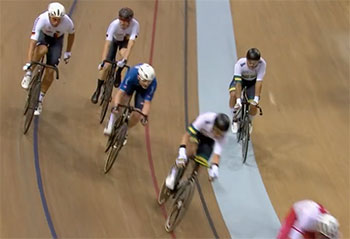
i would scarcely class myself as an expert on the various events that comprise a uci sanctioned world cup event, but i have sufficient working knowledge of madisons, points races and elimination races to comprehend that which takes place before me, whether in real-life, or on the telly box. in glasgow, on saturday eve, any potential misunderstandings were ameliorated by in-house commentary from the king of scotland, jimmy mccallum, who i last met at a revolution track meet several years ago.
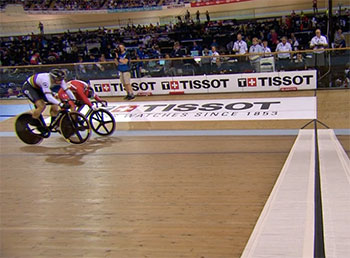
but, though my 'no frills' attitude to cycling in all its various forms frequently smacks of the arrogance displayed by the self-important, i can still understand why it may be necessary to break down any perceived barriers for those less well versed in the art of cycling in circles very quickly. however, i feel there may be limits to the seemingly patronising attempts displayed on the big screen at the chris hoy velodrome. at the risk of being hoist by my own petard, an unrecognised (by me) scottish female former track rider spent many a 'happy' moment encouraging a track sprinter to manipulate a metal ring around a bicycle-shaped wire sculpture, trying desperately to avoid touching said wire, and set off a buzzer.
he failed. several times.
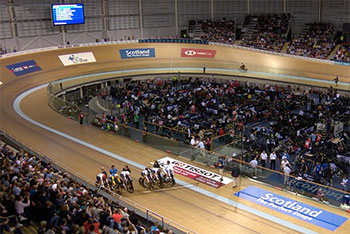
she also read out cards featuring colloquial glasgow expressions ('lang may your lum reek'), quizzing two female belgian riders as to what they thought the meanings might be. as if that weren't sufficient, she successfully persuaded (almost) the entire velodrome audience to participate in three successive rounds of 'mexican waves', purely to out-wave friday evening's audience. no doubt at the sunday event, she had them do so four times.
i do understand that it might be seen as necessary to present track cycling as all-round entertainment, suitable for everyone and not just conceited know-it-alls, such as yours truly, but surely making it even just a smidgeon more relevant to the reason why we were all there in the first place, isn't beyond the realms of possibility? even the programme had a kids' corner featuring a cyclist word search and a spot the difference (i admit, i struggled to find the fifth difference). those at least, bore some relevance to the subject at hand.

what, in my opinion, made the 'entertainment' all the more irrelevant, was the fact that the velodrome was effectively sold-out and the tickets hadn't just cost a few pence each. anyone who attended any of the three evenings, had presumably made a deliberately conscious decision to attend in the first place. add to that, the fact that the organisation was impeccable: the minute one event ended, the next one was ready to roll, meant that any peripheral goings-on were largely unnecessary.
it's a bit like islay's marketing group, who used to hold free, weekly visitor welcome evenings, when those visitors were already here. surely better to aim the welcome at those who had yet to decide to visit? does this happen at manchester and london too? that said, even those who were patronised, were treated to an astounding evening of unbelievable, quality, and competitive racing.
bit dubious about the disco music, however.
monday 11 november 2019
 ..........................................................................................................................................................................................................
..........................................................................................................................................................................................................prescriptive cycling
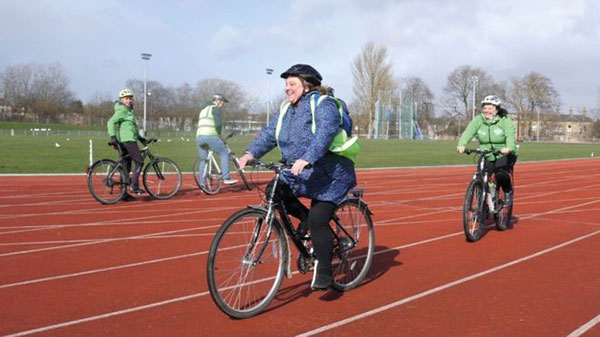
i am overly fond of quoting ultan coyle, formerly of rapha and now with canyon bikes, who once related "nothing's ever worse after a bike ride." of course, your mileage may vary on that one; i'm sure those who have need of commuting in central london may be less in agreement, though i seriously doubt that, after that, anything could be much worse. however, looked at with a more optimistic outlook, pedalling the highways and byways, with the sun in the sky and the wind at your back, strikes me as an ideal way to spend an hour/day or two.
even then, allowing for the fact that the wind seems rarely to be behind me, and often accompanied by persistent precipitation, the physical act of cycling i have generally found to banish any propensity towards negativity. i'm pretty sure my sunday morning colleagues would wholeheartedly agree, even if it is occasionally a struggle to clamber out of a cosy, warm bed on a cold, wet and windy sunday morning. the fact that i have generally found myself to be in the rudest of health, despite advancing years, has led me to frequently proclaim that 'cycling cures all ills', though mostly on the basis that it suits my purposes, when conversing with unbelievers.
it transpires, however, that i might have been (nearly) right all along. funding from west yorkshire combined authority, has allowed the flourishing of an initiative enabling health professionals to offer individuals with long-term health conditions the opportunity to undertake twelve-weeks of cycle training. the programme was designed to provide the participants with the opportunity to reach nhs activity guidelines of two-and-a-half hours per week. initially, only 18% of the 141 people referred by local health centres were reaching those numbers; by the end of the dozen weeks, that figure had risen to 73%.
though most of us accept the benefits fostered by regular cycling, one participant was quoted as saying "my fitness has improved, my lung function is a lot better than it has been and now I actually want to go out and do other things, and keep cycling, keep active and really start living my life." the benefits, of course, are not only physical, but equally applicable to those suffering from mental health problems.
this cycling-on-prescription scheme has been successfully trialled not only in yorkshire, but also in wales, manchester and london, but is not yet available across the land. not so very long ago, i printed a feature about a gp in inverness who was single-handedly operating a similar scheme, with apparently similar success.
predictably and perfectly justifiably, cycling uk's head of development, jenny box, said that the scheme showed cycling was good for overal wellbeing. "Now that we've got the evidence, we'd love to bring the gift of cycling to other parts of the country and help others on the path to recovery."
the day when it becomes possible to take a prescription to the bike shop, rather than the pharmacy, surely cannot be seen as too far distant?
sunday 10 november 2019
 ..........................................................................................................................................................................................................
..........................................................................................................................................................................................................the power of pink annual. rapha editions/bluetrain publishing hardback. 77pp illus. £15
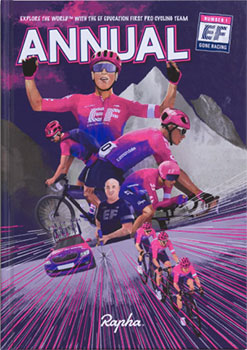
oor wullie allegedly lives in the town of auchenshoogle, and though his gang, consisting of fat bob, wee eck , 'soapy' soutar, and primrose paterson, has latterly met in a decrepit caravan known as holly rude', wullie is mostly depicted sat upon an upturned bucket. those of you resident north of the border may already be acquainted with this fictional character, originating in 1936 and appearing weekly in the 'sunday post'. his character has appeared in glasgow graffiti, accompanied by the bold text, 'rogue one', whic ought to gve southerners something of an insight into his character.
also resident in 'auchenshoogle' are the broons. were they to have lived in englandshire, they'd be more likely referred to as the browns. they (paw broon, maw broon, granpaw broon, hen, daphne and joe broon, maggie and horace broon, the twins and the bairn) also appear in dc thomson's weekly 'sunday post'. so popular are both the broons and oor wullie, that, originally on an alternating basis, a christmas annual would appear around this time of year.
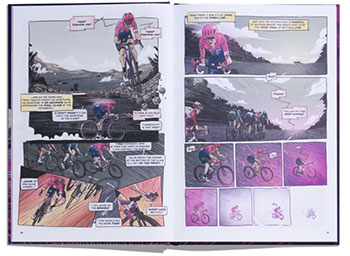
latterly, their popularity has allowed for both annuals to appear each year. receiving one or other or both was pretty much guaranteed each christmas in our household. for many a long year my brother would receive one, while i unwrapped the other, attesting to their suitability for all ages. though i've not received either for many a long year, i don't doubt that they've changed little in the intervening years. but now that i'm (allegedly) all grown up and a tad more obsessed with bicycles than upturned buckets in the town of auchenshoogle, what about an annual i could receive for christmas, or, better still, one i could give to others of a similar persuasion.
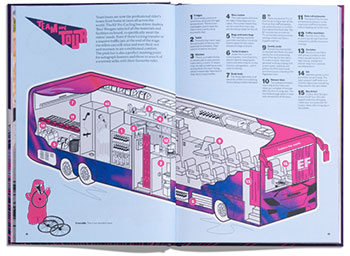
as luck would have it, the creative and eager to please people at rapha, blue train publishing, and ef education first have provided me (and, by implication, you) with the very annual in which i have occasionally expressed interest. featuring the tour of flanders, racing action, inside the team car, mechanics and masseurs, plus a great deal more, there is more to do in this book's 77 pages than you'd find to occupy yourself at center parcs. a mixture of humility and embarrassment precludes me from admitting how poorly i did in modolo's amazing maze, but how accurate was my perception in spotting the difference between two cannondale bicycles.

those who dote on graphical novels and comic books will find several instances of both to enjoy, while we who like to think of ourselves as mechanically adept can learn what it's like to cater for an entire truckload of cannondales. of course, it's all just a bit of light-hearted fun that we can enjoy at the end of the season, whether preparing to compete at junior level, or the world tour. the very reason that the windows in the ef education first team bus are heavily tinted, is because the riders are all trying to find the last remaining word in the included word search. the annual's cover illustrations from steve johnson are anything but lightweight.
team tactics can wait.
'the power of pink' annual is the perfect extension of the persona that rapha and ef education first have successfully cultivated throughout the season, ranging from lachlan morton's fourth place in the three-peaks 'cross race, to the team's inclusion in the dirty kanza they have brought new meaning to the word 'fun', when applied to world tour cycle racing. so, either way; if you're the sort of cycling obsessive who pores over the comprehensive results in ned boutling's almanack, the sort of fellow/fellowess, who takes one look at the numbers displayed on the garmin and utters a hearty laugh, or simply a small glaswegian who sits on an upturned bucket you need this annual before, after and during christmas.
the power of pink annual is published on saturday 9 november
friday 08 november 2019
 ..........................................................................................................................................................................................................
..........................................................................................................................................................................................................a few words with emily chappell

every ride undertaken by yours truly each weekend, is augmented with a garmin gps unit attached to the handlebars. contrary to common belief, i do actually switch on the device before leaving the house, and it displays my (lack of) speed, distance covered, calories burned and, most importantly (it's the big number at the top) what time of day it is. you see, i ride without a watch, something i have previously found to be a great irritant, so i leave it at home on bedside table.
though the above variety of parameters are dutifully recorded by the garmin, none of them get anywhere near strava, for i simply delete them before heading off the following morning. i have previously advertised my aversion to numbers, particularly those that threaten to interrupt the enjoyment of my bicycle rides. i care not one whit for galeforce winds and driving rain; i simply enjoy riding my bicycle, and i think that sentiment goes for many others in the velocipedinal realm. it's mostly a pleasurable experience, one that ends when we want it to and before it becomes too uncomfortable. endurance cycling, on the other hand, such as described in emily chappell's 'where there's a will', reviewed in yesterday's post, sounds perilously close to masochism. so i asked emily, what's the attraction of events such as the transcontinental?
"Well, perhaps 'endurance' is a misnomer. I'm still trying to figure out the precise terminology to use for the sort of cycling I do, because so much of the available language is permeated with this idea that it's all about pain and suffering, and pushing on when everything in you is screaming to stop. In reality, that's not a very big part of it.
"I am very rarely in pain on the bike, and if I'm suffering to an unreasonable extent, I'll stop riding, rather than do myself any serious damage. And those feelings and processes where I have to battle against my own reluctance, are all so much more interesting than just 'overcoming suffering'. I still haven't quite put my finger on how a person manages to contain the simultaneous desires to stop and to continue.
"But I've now written a whole book trying to capture that feeling. And perhaps that was the attraction of the racing. To take myself to that elusive place, and to see what I discovered there. Also, the joys were always far, far greater than the ordeals."
i won't pretend that my weekend rides are anything special. unless you have a predilection for riding quickly past single malt distilleries, while trying to keep dry and remain upright, there's simply not a book in it. and that could conceivably explain why my recall of each expedition is remarkably scant. folks like philippa york have astounding powers of recall, determining just where, when and who fitted that 38 inner ring to the campagnolo chainset of her peugeot carbon bike from the early 1980s. conversely, i cannot remember what i had for tea last sunday.
emily chappell seems similarly blessed, and possessed with a fluid and confident writing style. i asked her whether the writing of this book was always in her mind, even before first entering the transcontinental? her recall of events is impressive, and i wondered if she had been taking copious notes each day, prior to falling asleep from exhaustion?
"I can't remember exactly when I decided I wanted to write a book about ultra-distance, but it was around the time that my first book (What Goes Around) came out, after I'd raced in (and dropped out of) the 2015 Transcontinental. So when I first had the idea, I didn't know what the plot would turn out to be. I didn't know I'd end up winning the race. And I didn't know how central my friendship with Mike - and his death - would become to the story.
"I didn't take notes as I went along, but I'm not sure I needed to. I think in sentences and paragraphs anyway, and because you get so much time and headspace on long bike rides, I'll often pedal along for several hours, turning phrases over in my mind, fine-tuning their rhythm and syntax, and dwelling on the descriptions and discussions I'd created.
"I've always done this, and quite often when I sit down to write I find the words are already there to work with, as if I'd noted them down in a journal."
in the pursuit of a career as a graphic designer, i have worked with a wide variety of people, some of whom have hired me for my avowed expertise, prior to telling me just how to do the job they hired me for. many of these commissions, along with the work i've done for islay's local newspaper, involve typesetting, frequently necessitating that i read the text before deciding how best it should look on the page. this has brought to light the knowledge that there are a great number of folks who know a great deal more about stuff than yours truly, knowledge that seems un-allied to any grasp of the english language, or the grammar that would make it readable.
there is monty-python's archetypal post-match interview with a first-division footballer, whose standard reply to each and every question is "well i just kicked the ball, and there it was in the back of the net." soccer players are rarely employed for their literary expertise. emily chappell, however, seems possessed of an envious ability as a cyclist and an impressive skill to write clearly about the experience. her narrative in 'where there's a will' reads incredibly well, but is she comfortable as a writer? do the words flow easily, or is it every bit as hard as riding long distances over difficult terrain?
"It's both, but far more often the latter. My main experience of writing both books has been sitting miserably at my desk, despairing of my lack of talent and apparent inability to get the words to do what I want them to. (Curiously, I'll often go back the following day and find that what I've written is actually pretty good. I'm mystified by my inability to judge this while I'm writing it.) And I do recall some moments during races where I thought 'this is so hard, and has been for ages; maybe I'm not cut out for cycling after all.'
"In hindsight I feel very positively about both experiences, and hindsight lasts far longer than the moment itself. One thing I have learned, time and time again, is that when something looks 'effortless', be it a person's fluent prose or their uphill cadence, it almost certainly does not feel like that from the inside."
but writing is about much more than simply using the right words to describe any given situation. the scattergun approach of jotting things down as the memories occur would undoubtedly result in approbation of the avant-garde, but probably not reflected in copious sales at the book shop counter. in order to grasp the attention of the prospective reader, it's necessary to lure them into your world and keep them there until you've finished talking. in other words: structure.
on reading 'where there's a will' i confess that, through the opening chapters, i was under the misapprehension that i was reading of emily's transcontinental victory. that it was the clever prelude to her second (victorious) attempt was a pleasant surprise. was this deliberate, or a happy happenstance?
"I didn't intend for that to be the effect, though I'm pleased you've found that ambiguity. And the opening of the book (where I wake up on my back in a field, and momentarily have no idea what's going on) was half-consciously designed to represent so many of the moments in long races, where time seems to expand, or elide, and rather than feeling a sense of place, what you're really experiencing is a sense of placelessness.
"So in that sense, it's almost irrelevant where it occurred chronologically. It's all the same experience, the same bubble you enter into after a few days of sleep deprivation."
as i mentioned in my review, not every book has a happy ending. emily won the transcontinental race in 2015 and her book about the event is published today (thursday 7 november). therefore, anyone with an interest in this particular genre of cycling, will already be aware of the book's mid-point happy ending. however, in the spirit of 'one thing leads to another', in the process of aiming for one thing, others have a tendency to intervene.
that point in emily's career was meeting up with endurance cycling legend, mike hall, a gentleman whose inspiration, advice and friendship proved invaluable both prior to and after her transcontinental victory. his tragic death while participating in the premier edition of the indian-pacific wheel race was thus never going to allow the book to end as happily as it might have. had emily begun writing the book prior to hall's death in australia and if so, did that affect the structure of her intended narrative?
"I'd written bits and pieces, and I had a plan, and a proposal more-or-less ready to go. Everything fell apart a bit when Mike died, and it took me quite a while to put it back together (in some senses, of course, I never will). Eventually I realised that he - and his death - would be part of the narrative, and then struggled all the way through writing it, with whether or not that was actually a good idea.
"I wanted to tell his story, I wanted to tell my own (of which he was inextricably a part), and I wanted to take him down from his pedestal and restore him to the human being I'd known and loved. But I also wrestled with the idea that I might be exploiting my friend's death for creative capital, with the paradox that in telling new stories about him, I was adding to his legend, rather than undermining it, and the doleful realisation that no matter how I tried, I couldn't quite bring him back."
it will surprise remarkably few of those who read thewashingmachinepost on even an irregular basis, that what i end up writing about is not necessarily that about which i intended to write. sometimes that's a good thing, sometimes it's an infuriating thing, but almost always, it's a confusing thing. i have been advised that this is frequently due to a consciousness intent on expressing itself, in spite of my best efforts to do otherwise. so, in retrospect, mike hall's untimely death provided (for me at least) new meaning for the book. was that emily's hope? ultimately, was 'where there's a will' intended to be a tribute to his life?"
"I think there are enough tributes to Mike's life. (And although I struggled with the flood of obituaries and memorials that followed his death, I recognise that people have different ways of dealing with their grief, and that grief itself varies from person to person.) 'Where There's A Will' was supposed to be about long-distance cycling, my fascination with it, my love of it, and all that it's given me. Had Mike still been alive, he would have been alongside me while I wrote it. We would have discussed my progress on our rides, and I would have complained to him when it was going badly, and celebrated with him when it went well.
"As things have turned out the way they have, what I've produced is probably my best attempt to write the book without him. My grief was still quite raw during parts of the writing process, and I sometimes thought it might have been better to wait a year or two, until I could see how things turned out, and find a more detached perspective.
"The book (at least to me) contains a lot of anger and indignation at the way things turned out, and this enduring (though flawed) belief that if I try hard enough, I can find a way of using words to make sense of it all. That's impossible, of course, but it may have made it a better book. And I suppose, although it wasn't intended that way, the book will come to be read as a tribute. Once something's published, you lose control of what people can read into it, after all. And I knew that all along. Maybe it was my own complicated way of saying goodbye to him."
if you'll pardon the pun, everything has a natural cycle; a beginning, a middle and an end. obviously enough the period over which that lasts can vary widely, depending on the subject under discussion. when the end arrives, depending on your experience of the preceding process, you'll either try to hang on to that which has passed, or calmly tick the box and move onto the next stage. emily chappell rode two transcontinental events, taking victory at the second attempt. additionally, she took part in the strathpuffer 24 hour mountain-bike race and ireland's transatlanticway. will she continue to participate in similar endurance cycling events, or has that itch been scratched? is she now happier featuring on the organisational side?
"I think my racing days are over. Once I'd won a couple of races, and knew what it felt like, I lost the incentive to do so again. I'd proved I could do it, and that seemed to be enough for me. But I retain a very strong love of riding long distances. If I only had one day left on earth, I would cycle 100 miles or so, preferably through a mountain range, with a couple of good café stops. There's a certain tranquillity I can only touch when I'm a couple of hundred kilometres in. So these days, I'm doing a lot more audax, which seems to give me everything I want, with no competition, no remote scrutiny from dot-watchers, and exactly as much company and solitude as I want."
my sincere appreciation to emily chappell and james spackman of pursuit books for their invaluable assistance with this interview.
pursuit books | emily chappell
thursday 07 november 2019
 ..........................................................................................................................................................................................................
..........................................................................................................................................................................................................where there's a will. emily chappell. pursuit books hardback 288pp £14.99

on the first sunday of august each year, we hold our annual 'ride of the falling rain', the full parcours covering pretty darned close to 100 miles. those who undertake the full course usually complete the distance in around six hours, including a short stop at ardbeg distillery's old kiln café. they'll even offer a dram of their finest, if you ask nicely. this, you will doubtless agree, is hardly the most onerous day out on a bicycle, particularly in the light of islay being relatively flat. that said, if the rain pours and the wind blows, it could turn out to be one of your worst days on the bike (just ask those who rode in 2017).
however, once it's done, it's done; 'tis but a case of a brief bout of froth supping before heading home for a warm shower and a fine repast. any aches and pains will be quickly forgotten and on reaching work the following morning, there will be scant evidence of the weekend's strenuous activity, though quiet self-congratulation will probably continue until lunchtime.
there is, however, a portion of the velocipedinal venn diagram for whom such a paltry distance would scarcely be worth taking the bike out of the shed. i'm thinking here, not of the eager beavers who ride from london to paris over the course of three or so days, but the real hard corps, who enter ultra endurance events like the legendary transcontinental, entailing 4000km across europe in search of bragging rights that would put most of us in the shade.
one such individual is emily chappell, a former london courier who swapped the delights of metropolitan traffic on a fixed wheel, for the wide open spaces of the more obscure parts of europe.
though, as with many cycling related books, the opening chapter is entitled prologue, there is nothing by way of introductory pre-amble. "I woke up on my back. All around me the long grass quietly tossed and turned in the wind, and above me the moonless sky was fading from indigo to grey."
by the end of this short (four page) introduction, the difference between emily and most of the rest of us has already been underlined, alluding at one point to the fact that her destination of istanbul was but a week's riding, and the thought of such a distance was one being broken down into more manageable chunks, just to make sure she would actually arrive. it's worth pointing out that the transcontinental is a race and not just an extensive, if self-supported bicycle tour.
emily chappell, like many who go onto ride such unfathomable distances, was introduced to the genre via the well-worn audax path, however, it transpires that this, her first entry into the transcontinental was not going to bring victory. riding from belgium to istanbul was never going to be an easy ride, nor one that that brought the audience and kudos associated with events such as the tour de france. "...the Transcontinental had no publicity caravan, and almost no spectators..."
cleverly, there is no indication in the narrative featured in the first few chapters, that her race about which we are reading, ends prematurely and a touch ignominously. in almost a reprise of the book's first sentence, "A couple of hours later I woke up on my back, in the corner of a wind-tossed field, and found that there was almost nothing of me."
this unfortunate state of affairs led to a hospital visit in lubljana with her bike some 50km away at a guesthouse. the cause of her untoward hospital visit had been pain in her chest, one that gave her cause to believe it might be a heart attack, but turned out to be a non-life threatening muscle strain.
by that time, she was out of the race.
oddly enough, constant sleep deprivation, occasional bouts of hunger and a plethora of aches and pains while attempting to win a 4,000km race, were insufficient to keep emily (and others), from repeating the process. in the interim, however, she returned to her parents' home in mid-wales to escape from the claustrophobia of the metropolis. occupying the intervening months, she participated in north scotland's twenty-four hour strathpuffer mountain bike race and was asked to crew for a friend on the race across america.
in a meeting that would subsequently prove a major influence, in london, chappell came across endurance riding legend, mike hall, who, coincidentally, had won the strathpuffer mtb race in 2011. hall's presence in emily's cycling career would soon become particularly significant.
meanwhile, she had entered the following year's transcontinental, now a more experienced and perceptive rider, planning this time to complete the route from geraardsbergen to canakkale in twelve days. the event organiser was mike hall. it would not be unusual to suppose that anyone undertaking such an extensive bike ride would be well-versed in the intricacies of bicycle mechanics, particularly in the light of the self-supported nature of the transcontinental. however, according to emily "I was not a person who tinkered with her bike for fun, or who compulsively took things apart to see how they worked. My obsession was with the feeling I got when they worked."
this time round, emily chappell arrived at the finish, victorious, having won the women's section of the race by a substantial margin. "My winner's jersey didn't fit well, and the pale-grey merino it was made from strained across my broad chest when I did it up. Clearly the sponsor had assumed that a woman capable of winning the Transcontinental would be smaller."
after her victory, chappell returned to the solitude of wales, joined, only an hour's ride uphill, by mike hall and his partner, anna. over the ensuing days and weeks, chappell and hall completed many lengthy rides through the welsh countryside, climbing its many ascents in the pursuit of pedalling nirvana. hall and his partner soon split; while working on the route for the 2017 transcontinental, it appears they had many disagreements and the relationship had faltered. with mike staying on in his welsh retreat, there were plenty of opportunities for chappell to learn from his greater endurance riding experience.
hall was using their continued and extensive riding as preparation for a new australian race, the indian-pacific wheel race, while chappell had entered the irish transatlanticway race. without wishing to reveal too much of those remaining few chapters of 'where there's a will', mike hall never reached the finish line of the indian-pacific wheel race. not every book has a happy ending.
personally, i have no desire to undertake any bike ride more demanding than islay's falling rain, but chappell's book is one that surely ought to be read by anyone with almost any type of bicycle in the bike shed? her writing is impressive, clear, concise, self-effacing and utterly free of anything approaching self-congratulation. riding thousands of kilometres is simply something that she does. the narrative is beautifully constructed and has everything to do with life and impressively little to do with bicycles. james spackman's pursuit books deserves every gramme of approbation it is likely to receive.
worry not if your longest trip on a bike is from home to the shops; there is much to be gained from reading emily chappell's 'where there's a will'. learning, enjoyment, despair and bike riding; real life in 288 pages.
an interview with author, emily chappell, will be published in tomorrow's post. where there's a will is published on thursday 7 november.
wednesday 06 november 2019
 ..........................................................................................................................................................................................................
..........................................................................................................................................................................................................it's not a bike jim, at least not as we know it

the village of bowmore has recently had bestowed upon it, a brand-new, all singing, all-dancing, all-weather pitch. this has been constructed adjacent to both the primary and secondary schools, allowing for both educational institutions to use the new facility for school football or hockey matches. given the knowledge that the west of scotland is one of the wettest parts of europe, a pitch consisting of astro-turf makes perfect sense, given the often soggy nature of the current grass pitches. the only perceived downside is the complete loss of muddy bragging rights after a match held in less than clement conditions.

however, given the nature of synthetic grass and the fact that it is closer to a shag-pile carpet than 'real' grass, running about hither and thither with feet encased in regular football or rugby boots with their attendant metal studs, is unlikely to maintain the product's integrity. thus, the council's leisure operations department has issued not only a raft of applicable charges for use, but images of acceptable footwear. and at the considerable risk of being thought of as an irritating pedant, i have an irresistable need to point out that the phrase "the following non-permitted footwear is prohibited" contains a double-negative.
were it to end there, collective heavy sighs all round would be probably considered the least that i deserve, but clearly printed on the price list is a sentence beginning On Saturday's and Sunday's.... the post's well-educated readership will, of course, have noted that both those apostrophes are null and void, because the days, as published, are plurals, not possessives. however, these particular examples are hardly unique; i have recently come across nomenclature describing an electric vehicle that has been latterly delivered to parcel delivery firm dpd.
according to the manufacturers, oxford-based 'electric assisted vehicles' (eav), they decided to 'engineer down' from a lightweight commercial vehicle, rather than 'engineer up' from a bicycle. this, they state, means that operators of the vehicle will find many of the elements they expect from van use, but incorporating the 'immense efficiencies and zero emissions of an e-cargo bike'. it is at this point i feel the english language is in danger of being misused.

the late david duffield, former eurosport commentator, preceded his television years, not only working in sales and marketing for the raleigh bicycle company, but at one-time, racing tricycles. these particular velocipedes are now less common than once they were, but proved very tricky machines to ride at speed, given their less than ideal proclivity for keeping all three wheels on the ground during rough and ready cornering. however, the description tricycle adequately explains the existence of three wheels about its person.
unfortunately, in describing this remarkably van-like vehicle, one for which i have nothing but praise, they've really not helped themselves by categorising it as an e-bike. the word 'bike' is, by convention, viewed as a contraction of the word 'bicycle'; the prefix 'bi' is derived from the latin, meaning 'two'. as you can see from the accompanying images, the vehicle under discussion features four wheels, in direct contravention of that implied by the word 'bike'.
if climate change and environmental concerns continue to remain at the top of every political agenda, as well they ought, the chances are there will be more electric-assist vehicles such as this, rather than fewer. in which case, we are in desperate need of a new, more appropriate denomination. in the spirit of cycle-related altruism, i'd like to suggest 'quattro', as in 'e-quattrocycle'. that way, we can all achieve a greater clarity about that which we converse. otherwise, when coffee-time talk turns to e-bikes, there will undoubtedly be demands for greater specificity.
you can thank me later.
tuesday 05 november 2019
 ..........................................................................................................................................................................................................
..........................................................................................................................................................................................................